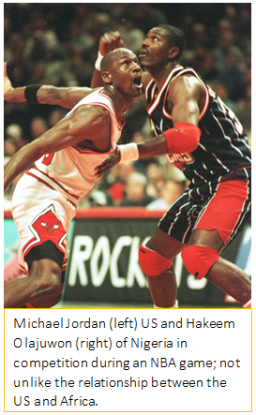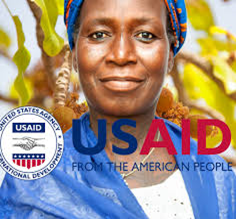Throughout recorded history, Africa and the U.S. have been linked intricately. Long before moves were made in the corridors of government and in boardrooms, aimed at securing ‘mutually beneficial’ alliances, alliances had been brokered in the stars to keep them together. The ties (and lies) that bind them run deep. It is unclear what both parties see and expect in detail from each other. One thing is certain; the U.S. and Africa need each other.
 This bond has always seen the U.S. characteristically dominate its African contemporaries. Africa’s fortunes are however changing. During this period of transition, relationship with the U.S. has seen great improvement. The U.S. has been slow to take advantage of the opportunities available in ‘the new Africa’. In areas such as energy, trade and investment, development assistance (aid distribution), national and global security, and the rise of new actors particularly China on the scene, it needs to draw up new tactics to be able to keep up with emerging trends to quickly remedy the anomaly.
This bond has always seen the U.S. characteristically dominate its African contemporaries. Africa’s fortunes are however changing. During this period of transition, relationship with the U.S. has seen great improvement. The U.S. has been slow to take advantage of the opportunities available in ‘the new Africa’. In areas such as energy, trade and investment, development assistance (aid distribution), national and global security, and the rise of new actors particularly China on the scene, it needs to draw up new tactics to be able to keep up with emerging trends to quickly remedy the anomaly.
The Economists in the span of 13 years has gone from labeling the continent the ‘Hopeless Continent’ to the ‘Rising Continent’ to further recalibrating to ‘Hopful Continent’. These labels have been justified with Africa hosting some of the fastest growing economies of the world. This is not to say that the continent has rid itself of all its maladies; far from it. There continue to exist major issues that plague the continent and thus need immediate attention.
The proliferation of insurgent groups such as al-Qaida in the Islamic Maghreb, Ansar Dine, the movement for Unity and Jihad in West Africa (all in northern Mali), al-Shabaab in Somalia, Boko Haram in Nigeria and other such groups across the continent pose a threat to global peace and U.S. interests. While Sierra Leone, Liberia, Cote d’Ivoire transition from war towards peace, Libya, Egypt, Algeria, South Sudan, Somalia remained in varying degrees of turmoil. As a result, the US established the U.S. African Command (AFRICOM) in 2008 to coordinate its African military operations and assist in African countries building their own military capacity. The result is nations solving their own security problems and the US being able to keep an eye on terrorist groups who try to exploit the African continent of human and natural resources.
A major reason for insecurity in the region is the level of poverty and economic underdevelopment. Indeed, there is a strong correlation between political stability and electrification rates. As a tool to curtail security issues, and also to satisfy its trade and investment appetite/need, the African continent has become a major trade partner to the U.S. In areas such as energy (especially crude oil), agriculture, timber, precious minerals, etc. the U.S. tends to be very active est ablishing new and entrenching already existing trade relationships The threat of a Chinese upper hand over the U.S. on the African continent to a large extent has driven the rise in strategic investments (especially government investments) by both power players on the continent. It would be in the interest of the US to further entrench its grip on the continent by extending agreements/protocols such as the Africa Growth and Opportunity Act (AGOA) which expires in 2015. The two paths on which the US can thread (aid and trade) are fraught with their own peculiar challenges. However, these are challenges that will have to be faced if the end is to be justified.
ablishing new and entrenching already existing trade relationships The threat of a Chinese upper hand over the U.S. on the African continent to a large extent has driven the rise in strategic investments (especially government investments) by both power players on the continent. It would be in the interest of the US to further entrench its grip on the continent by extending agreements/protocols such as the Africa Growth and Opportunity Act (AGOA) which expires in 2015. The two paths on which the US can thread (aid and trade) are fraught with their own peculiar challenges. However, these are challenges that will have to be faced if the end is to be justified.
One of those strategies the U.S. government uses to get to its ends is development assistance funding programs (aid distribution). This is a way that African and American organizations collaborate on activities that aim at holistically raising African standards of living. The opportunity exists for the U.S. to invest in areas from national security, humanitarian to economic reasons.
There are barrage of reasons why Africa matters to the US. It is why the continent can no longer be taken for granted by the US. It is only with thoroughness in depth of foresight that the banes and blights of hindsight can be dealt. Given the current circumstances, Africa is positioned excellently to enjoy a good end. This is not to downplay the degree of benefits the U.S. is bent on enjoying. It is for the sake of posterity that this time in history is of utmost importance not just to the African continent, but also for global consequence.
Africa and the U.S.- by Aaron Ayamga, Patrick Vetsch, Derry Bernard Wanye
The West claims they want to spur economic growth in Africa through an increase trade yet when we convert some of our primary goods into finished goods before exporting them, they use their offensive weapon of tariff escalation to discourage that. Apart from doing that to make us remain as primary goods producers, what else could be contributing to this?
Andrews Osei Bonsu
I believe the relationship between the U.S and Africa is a two-way relationship. In as much as we matter to them, they also matter to us greatly. Even though we may not want to admit it, we do need their help because we do not have all the available resources we need as a continent for now to progress. Talk about expertise and equipments, its highly lacking regardless of our many raw materials
I am all for patriotism and individualism however the moment we disregard all the help we receive from the West as trash will be the moment we begin a downward spiral into our own doom as a nation. We have not put enough self sufficiency strategies in place to have the audacity to be downplaying the help we get.
-Daniel Adae Bonsu
It is clear that both the US and China are competing for Africa’s attention, but the US is seeking for this attention by tarnishing the image of China to Africa which makes it difficult for me to trust them
Dorcas Maku Tamatey
I understand you Dorcas. A case of sabotage. Both countries look to try and solidify their place in the world at a superpower but certainly this has invariably come as an expense to the development of Africa.
Daniel Adae Bonsu